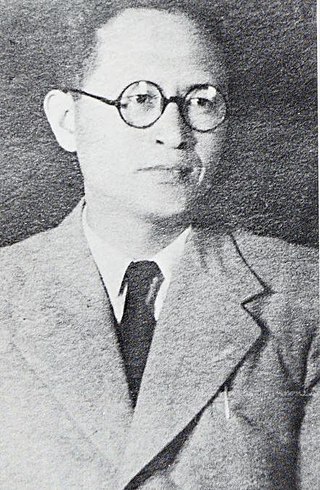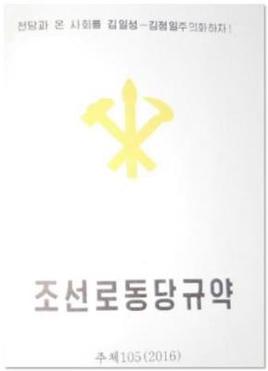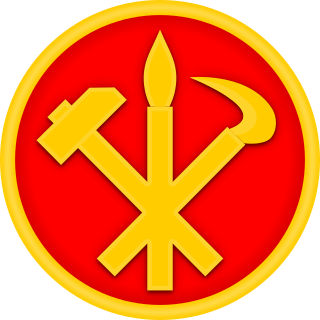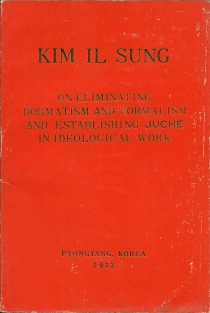
The politics of North Korea takes place within the framework of the official state philosophy, Kimilsungism-Kimjongilism. Juche, which is a part of Kimilsungism-Kimjongilism, is the belief that only through self-reliance and a strong independent state, can true socialism be achieved.

The Workers' Party of North Korea was a communist party in North Korea from 1946 to 1949 and was a predecessor of the current Workers' Party of Korea. It was founded at a congress on 28–30 August 1946, by the merger of the northern branch of the Communist Party of Korea and the New People's Party of Korea. Kim Tu-bong, the leader of the New People's Party, was elected chairman of the party, while Chu Yong-ha and Kim Il Sung were elected as vice chairmen. At the time of establishment, the party is believed to have had about 366,000 members organized in around 12,000 party cells.
The Communist movement in Korea emerged as a political movement in the early 20th century. Although the movement had a minor role in pre-war politics, the division between the communist North Korea and the anti-communist South Korea came to dominate Korean political life in the post-World War II era. North Korea, officially the Democratic People's Republic of Korea, continues to be a Jucheist state under the rule of the Workers' Party of Korea. In South Korea, the National Security Law has been used to criminalize advocacy of communism and groups suspected of alignment with North Korea. Due to the end of economic aid from the Soviet Union after its dissolution in 1991, the impractical ideological application of Stalinist policies in North Korea over years of economic slowdown in the 1980s, and the recession and famine during the 1990s, North Korea has replaced Marxism-Leninism with the Juche idea despite nominally upholding Communism. References to Communism were removed in the North Korean 1992 and 1998 constitutional revisions to make way for the personality cult of Kim's family dictatorship and the North Korean market economy reform. The Workers' Party of Korea under the leadership of Kim Jong Un later reconfirmed commitment to the establishment of a communist society, but orthodox Marxism has since been largely tabled in favor of "Socialism in our style". Officially, the DPRK still retains a command economy with complete state control of industry and agriculture. North Korea maintains collectivized farms and state-funded education and healthcare.

The Workers' Party of Korea (WPK), also called the Korean Workers' Party (KWP), is the sole ruling party of the Democratic People's Republic of Korea, commonly known as North Korea. Founded in 1949 from a merger between the Workers' Party of North Korea and the Workers' Party of South Korea, the WPK is the oldest active party in Korea. It also controls the Korean People's Army, North Korea's armed forces. The WPK is the largest party represented in the Supreme People's Assembly and coexists with two other legal parties that are completely subservient to the WPK and must accept the WPK's "leading role" as a condition of their existence. The WPK is banned in the Republic of Korea under the National Security Act and is sanctioned by the United Nations, the European Union, Australia, and the United States.

Pak Chang-ok was a North Korean official and was a leader of the Soviet Korean faction of the Workers' Party of Korea (WPK), with members being mainly ethnic Koreans born in Soviet Union, after the suicide of their first leader, Ho Ka-i.

Alexei Ivanovich Hegai, also known as Ho Ka-i, was a Soviet political operative in North Korea (DPRK) and leader of the Soviet Korean faction within the early political structure of North Korea. He was the second vice-chairman of the DPRK Politburo from 1949 until he was purged. He allegedly killed himself in Pyongyang and was replaced as leader by Pak Chang-ok.

The Central Military Commission of the Workers' Party of Korea (CMC) is an organ of the Central Committee of the Workers' Party of Korea (WPK) which heads the Korean People's Army (KPA).

The Central Committee of the Workers' Party of Korea is the highest organ between national meetings of the Workers' Party of Korea (WPK), the ruling party of North Korea. According to WPK rules, the Central Committee is elected by the party congress and the party conference can be conferred the right to renew its membership composition. In practice, the Central Committee has the ability to dismiss and appoint new members without consulting with the wider party at its own plenary sessions.

In North Korea, the Political Bureau of the Central Committee of the Workers' Party of Korea (WPK), or simply the Politburo, formerly the Political Committee (1946–61), is the highest decision-making body in the ruling party between sessions of its Central Committee. Article 25 of the Party Charter stipulates that "The Political Bureau of the Party Central Committee and its Standing Committee organize and direct all party work on behalf of the party Central Committee between plenary meetings. The Political Bureau of the Party Central Committee shall meet at least once every month." The Politburo is elected by the Central Committee of the Workers' Party of Korea.

The Secretariat of the Workers' Party of Korea, formerly known as the Executive Policy Bureau (2016–21), manages the work of the Politburo of the Workers' Party of Korea and its Presidium. The General Secretary leads the work of the Secretariat, and the body is composed of several members.
The August faction incident, officially called the "Second Arduous March", was an attempted removal of Kim Il Sung from power by leading North Korean figures from the Soviet-Korean faction and the Yan'an faction, with support from the Soviet Union and China, at the 2nd Plenary Session of the 3rd Central Committee of the Workers' Party of Korea (WPK) in 1956. The attempt to remove Kim failed and the participants were arrested and later executed. Through this political struggle, Kim Il Sung quashed all opposition to him within the central party leadership.
The history of the Workers' Party of Korea (WPK) encompasses the period from 1949 onwards.

The 3rd Congress of the Workers' Party of Korea (WPK) was held in Pyongyang, North Korea, from 23–29 April 1956. The congress is the highest organ of the party, and is stipulated to be held every four years. 916 delegates represented the party's 1,164,945 members. The 3rd Central Committee, elected by the congress, reelected Kim Il Sung as WPK Chairman, and a number of deputy chairmen.

The 4th Congress of the Workers' Party of Korea (WPK), referred to by Kim Il Sung as the "Congress of Victors", was held in Pyongyang, North Korea, from 11 to 18 September 1961. The congress is the highest organ of the party, and is stipulated to be held every four years. 1,657 voting and 73 non-voting delegates represented the party's 1,311,563 members. The 4th Central Committee, elected by the congress, reelected Kim Il Sung as WPK Chairman, and a number of deputy chairmen.

Chu Yong-ha was a North Korean politician and diplomat. Chu was elected into several posts in the Workers' Party of North Korea, the predecessor of the Workers' Party of Korea, in its early days. Chu was the target of plots ensuing from factional strife within the party. As a member of the Domestic faction, Chu was opposed by the Guerrilla, Soviet and Yan'an factions.

The Rules of the Workers' Party of Korea are the by-laws of the Workers' Party of Korea (WPK). It sets the rules of the organization and membership of the party. According to the rules, the WPK Congress is the highest body of the party and it, along with the WPK Conference, can amend the rules. The rules defines the character, task, and methodology of the party. According to it, the Party strives to impose communism on the whole of the Korean Peninsula. Recent revisions of the rules have defined Kimilsungism–Kimjongilism as the ideology of the party.

Pak Chong-ae, also known as Pak Den-ai, was a North Korean politician.

The 2nd Central Committee of the Workers' Party of Korea (WPK) was elected at the 2nd Congress on 30 March 1948, and remained in session until the election of the 3rd Central Committee on 29 April 1956. In between party congresses and specially convened conferences the Central Committee is the highest decision-making institution in the WPK and North Korea. The 2nd Central Committee was not a permanent institution and delegated day-to-day work to elected bodies, such as the Political Committee, the Standing Committee, the Organisation Committee and the Inspection Committee in this case. It convened meetings, known as "Plenary Session of the [term] Central Committee", to discuss major policies. Only full members had the right to vote, but if a full member could not attend a plenary session, the person's spot was taken over by an alternate. Plenary session could also be attended by non-members, such meetings are known as "Enlarged Plenary Session", to participate in the committee's discussions. During its tenure it held five plenary sessions, one enlarged session, seven joint plenary sessions and four stand-alone plenums.

The Propaganda and Agitation Department, officially translated as the Publicity and Information Department, is a department of the Central Committee of the Workers' Party of Korea (WPK) tasked with coordinating the creation and dissemination of propaganda in North Korea. It is the highest propaganda organization in the country.

On Eliminating Dogmatism and Formalism and Establishing Juche in Ideological Work, also known as the "Juche speech", was a speech delivered on 28 December 1955 by Kim Il Sung. The address mentioned his Juche ideology by name for the first time. It is considered one of Kim's most important works and a "watershed moment" in North Korean history. Views differ if the speech used the term juche to launch an ideology or more conservatively to assert that the Korean people were the subject of the revolution. The former believes that Juche, as a distinct ideology, was developed by Hwang Jang-yop on his re-discovery of the speech. The speech was published for the first time in 1960 and in many subsequent, heavily edited revisions since.












